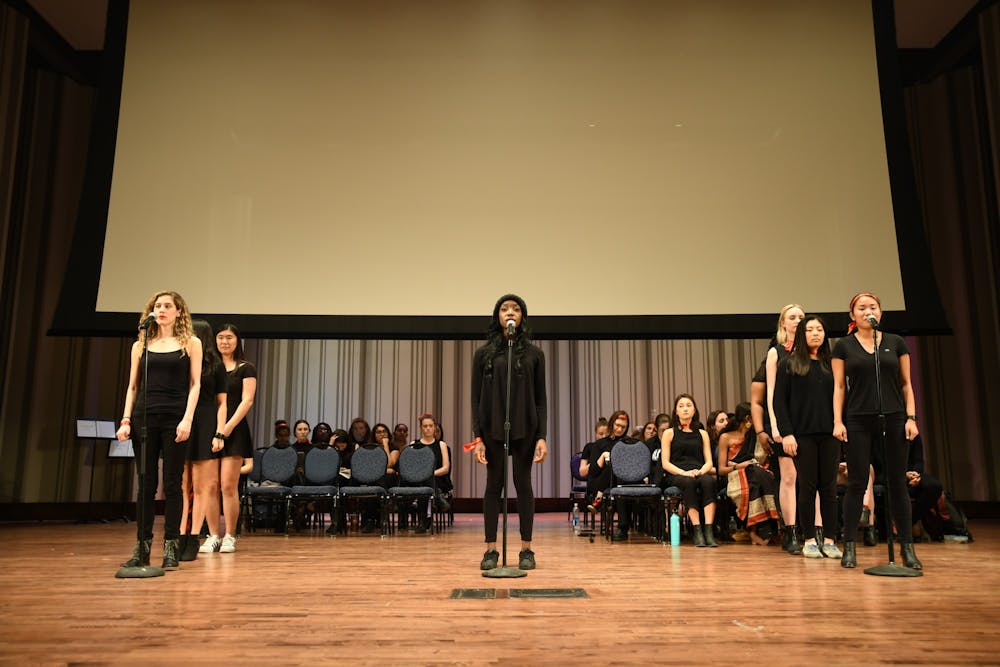
Penn Monologues will be a more inclusive production that doesn’t center around the cis female experience.
Credit: Idil DemirdagPenn Monologues will replace the Vagina Monologues for Penn V-Day’s annual production in late February.
Penn V-Day's board, also known as V-Board, decided, in spring 2018, to replace the Vagina Monologues to showcase a more inclusive production not centered around the cis female experience, V-Day Workshop Director and College senior Briar Essex said.
This year’s show will include 23 original monologues on topics including sexual assault, identity, and gender-based violence written and performed by Penn community members. The production will feature different forms of work alongside traditional monologues, such as audio recording, dance, songs, and poetry.
Penn V-Day is part of a national organization that aims to end violence against women and girls. They produce a performance of the Vagina Monologues each February and donate the proceeds to local projects or organizations that work to end violence against women.
The Vagina Monologues is a play written by Eve Ensler in 1996 that addresses women's sexuality and the stigma around sexual violence. The play consists of 27 monologues based on the experiences of over 200 women, Essex said. V-Board found Ensler’s script to be outdated and decided to replace the Vagina Monologues with original monologues, Essex added.
The Penn Monologues feature original monologues based on student experiences, as opposed to performing Ensler's play verbatim.
Essex said that the Vagina Monologues promotes a particular form of womanhood which equates being a woman to having a vagina.
“[The Vagina Monologues] erases the identity of women without vaginas or people who have vaginas and aren’t women,” Essex said. “But it also erases the fact that a lot of people find empowerment in a lot of other ways.”
Essex added that the Vagina Monologues did not "make space" for women of color and trans people.

“Now, the people making it happen at Penn are a Black woman and a trans person,” Essex said, referring to themselves and V-Day Artistic Director and College senior Mckayla Warwick. “The original conceivers of the [Vagina Monologues] could not have conceived the two of us ever doing it.”
Penn Monologues began in 2010 and was last performed in 2017 because the show required "so much work," Essex said, based on a conversation with former Penn Violence Prevention Director Jessica Mertz.
Before deciding to put on Penn Monologues, Essex said that V-Board considered putting on a “split-show” in which Ensler’s Vagina Monologues was followed by a number of original monologues from the Penn community. V-Day Executive Chair and College senior Olivia Bridges added that the University of California at Berkeley produced a similar show in 2018, following Ensler’s script with a production called “Our Monologues.”
Following the performance, Essex said that V-Day International and Ensler asked the students not to alter the performance again by adding the original monologues. Because this altered show could potentially hurt the longevity of V-Day at Penn, Essex said the board decided against performing both Vagina Monologues and original monologues.
College senior Claire Huffman is performing an original monologue that combines a critique of the Vagina Monologues with personal experiences.
“I think it’s more interesting to get first hand stories from individuals that [you do] not necessarily know but go to the same school and have similar experiences,” Huffman.

Last year, V-Day held monthly open mic nights for content creators to share experiences around gender-based violence, sexual violence, sexuality, and other themes that V-Day brings awareness to on campus, Bridges said.
Bridges, Essex, and Warwick said the replacement of the Vagina Monologues has given them more autonomy over the show. Bridges added that this year when they were looking for submissions, they encouraged submissions in whatever format the writer felt was most appropriate to tell their story.
Warwick added that the show is organized in a more narrative arc that begins with some lighter pieces and ends with healing, as opposed to the Vagina Monologues which Essex likened to “whiplash” because of its emphasis on shock value.
The show will include a content warning and allow time for audience members to leave the room, as some monologues will describe writers’ experiences with sexual assault, particularly on Penn’s campus, Warwick said.
In the last 20 years, V-Day has formed a close relationship with the Philadelphia Center Against Sexual Violence, formally known as Women Organized Against Rape, and raised over $200,000 for the organization, Bridges said. Bridges added that the timing of the switch to the Penn Monologues coincidentally aligned with WOAR’s name change, as both groups looked to become more inclusive.
V-Day will continue to donate their proceeds from the Penn Monologues and other efforts on campus including a fashion show, 24-hour radio marathon, and profit-share at Kiwi to WOAR.
Penn Monologues will take place Thursday Feb. 20, Friday Feb. 21, and Saturday Feb. 22 at 7pm. The Thursday and Friday performances will be in the ARCH Auditorium and the Saturday performance will be at The Rotunda. V-Day will also host a "talk back" on Sunday, March 1 where community members can share their feedback on the show.
The Daily Pennsylvanian is an independent, student-run newspaper. Please consider making a donation to support the coverage that shapes the University. Your generosity ensures a future of strong journalism at Penn.
Donate




